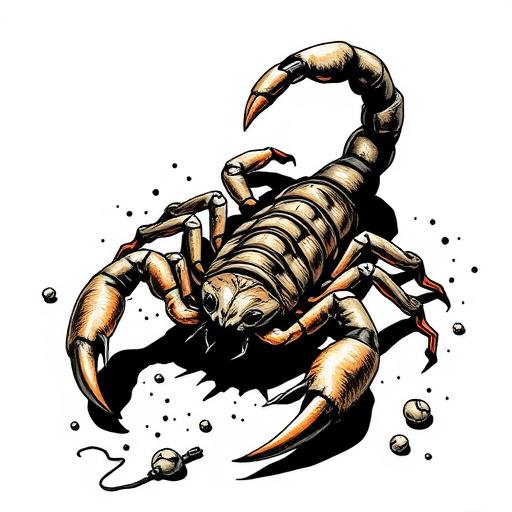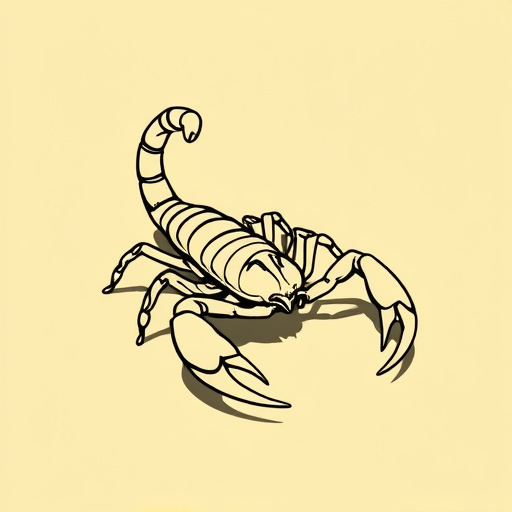Scorpion stings can cause serious health issues, with symptoms ranging from local pain to systemic distress. Prompt action, including staying calm, removing spines, cleaning the wound, and applying ice, is crucial for managing mild cases. However, severe reactions like breathing difficulties or intense pain require immediate medical attention. While home remedies offer temporary relief, they shouldn't replace professional care for severe stings. Preventing scorpion bites through effective scorpion control measures, such as maintaining a clean environment, sealing entry points, and using natural repellents, is paramount to ensure safety in regions with high scorpion prevalence.
Scorpion stings can range from mild discomfort to severe, life-threatening reactions. Understanding these stings, their causes, and symptoms is crucial for safe and effective treatment. This guide delves into immediate actions, home remedies, medical interventions for severe cases, and scorpion control measures to prevent bites. By following these guidelines, you’ll be better equipped to handle scorpion encounters and ensure proper care if a sting occurs. Remember, knowledge is the best defense against these formidable arachnids.
- Understanding Scorpion Stings: Causes and Symptoms
- Immediate Actions After a Scorpion Sting
- Home Remedies for Scorpion Sting Treatment
- Medical Interventions for Severe Reactions
- Preventing Scorpion Bites: Scorpion Control Measures
Understanding Scorpion Stings: Causes and Symptoms

Scorpion stings can be a serious issue, especially for those living in regions where scorpions are prevalent. Understanding these stings is crucial for effective scorpion control. When a scorpion stings, it injects venom through its sharp, barbed tail. This venom contains a mix of enzymes and neurotoxins that can cause local and systemic reactions in humans.
Symptoms typically include immediate pain, swelling, and redness at the site of the sting. In some cases, especially with more toxic species, symptoms may spread systemically, leading to nausea, vomiting, diarrhea, cramping, and in severe cases, respiratory distress or cardiovascular complications. Knowing these potential outcomes can help individuals recognize the need for prompt medical attention and effective scorpion control measures.
Immediate Actions After a Scorpion Sting

If stung by a scorpion, immediate action is crucial for safe and effective treatment. First, remain calm to prevent panic, which can lead to faster heart rate and increased pain. Then, carefully inspect the sting site for any visible spines that may have remained embedded; gently remove them with a pair of tweezers if present. Wash the affected area with mild soap and water to reduce the risk of infection. Applying ice or a cold compress can help alleviate pain and swelling.
Seeking scorpion control measures is also important, especially if you suspect the sting was from a venomous species. Avoid scratching or rubbing the sting site, as this might introduce bacteria and increase inflammation. Over-the-counter pain relievers like ibuprofen or acetaminophen can be taken to manage discomfort. In severe cases, particularly with systemic symptoms such as nausea, difficulty breathing, or intense pain, immediate medical attention should be sought.
Home Remedies for Scorpion Sting Treatment

When it comes to home remedies for scorpion sting treatment, there are several popular options that can provide some relief. One common approach is applying a paste made from baking soda and water directly to the affected area. This mixture helps neutralize the venom’s effect and reduce pain. Another natural remedy involves using vinegar; its acidic nature is thought to break down the venom, offering a quick soothing sensation.
Additionally, many advocate for ice packs as an effective home treatment. Applying cold to the sting can help constrict blood vessels, reducing swelling and pain. Some even suggest using aloe vera gel due to its known anti-inflammatory properties. While these methods can offer temporary relief, it’s crucial to remember that severe scorpion stings may require medical attention, especially for children, the elderly, or individuals with pre-existing health conditions. Effective scorpion control measures are essential to prevent such incidents and ensure the well-being of everyone in the household or affected area.
Medical Interventions for Severe Reactions

In cases where a scorpion sting causes severe symptoms, such as difficulty breathing, swelling in the face or throat, nausea, dizziness, or cardiovascular issues, immediate medical attention is crucial. These reactions can indicate a potentially life-threatening anaphylactic shock. During such emergencies, the focus should be on stabilizing the patient and ensuring their safety.
Medical interventions may include administering epinephrine (adrenaline) to counteract the severe allergic response. Intravenous fluids can help manage cardiovascular stability, while antihistamines and corticosteroids might be prescribed to reduce inflammation and itching. Proper scorpion control measures are also essential to prevent further exposure and subsequent stings, especially in individuals living or traveling in areas where scorpions are prevalent.
Preventing Scorpion Bites: Scorpion Control Measures

Preventing scorpion bites is the first line of defense in keeping yourself and your family safe. Scorpion control measures should be implemented to minimize the risk of interaction with these creatures. Maintaining a clean and clutter-free environment, particularly in areas known for scorpion habitats, can significantly reduce their presence. Regularly sweeping and vacuuming helps eliminate hiding spots, while sealing gaps and cracks around doors and windows prevents them from entering homes.
Using natural repellents like citrus oils or specific plants known to deter scorpions can also be effective. Additionally, professional scorpion control services offer treatments tailored to local species, ensuring long-term prevention. Regular inspections and maintenance are key to identifying and addressing potential entry points, making your space less inviting for these arachnids.
Understanding scorpion stings and taking proactive measures is key to effective treatment and prevention. By knowing the causes, symptoms, and immediate actions to take, individuals can minimize discomfort and potential risks. Home remedies offer some relief, but for severe reactions, prompt medical intervention is crucial. Implementing scorpion control measures in vulnerable areas is essential to reduce exposure and protect oneself from these potentially dangerous stings. With the right knowledge and precautions, it’s possible to safely navigate encounters with scorpions. Remember, being prepared and aware of scorpion control techniques can make all the difference in managing and preventing harmful stings.
